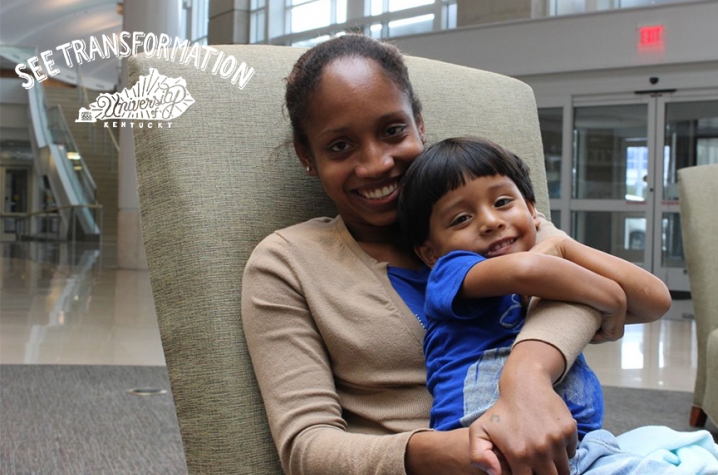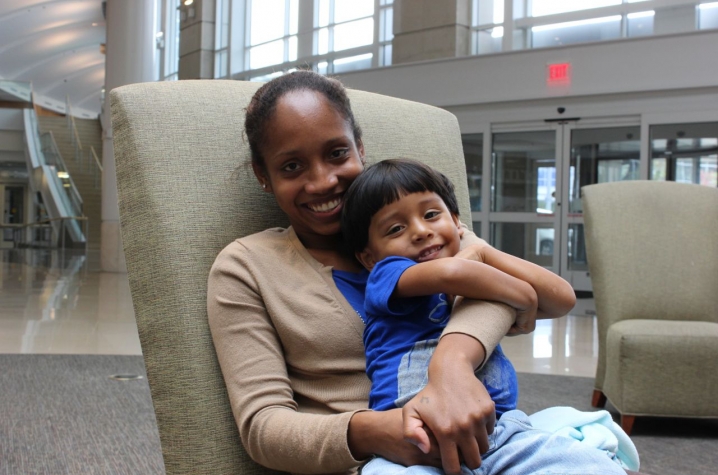UK Pediatric Surgeon Intervenes to Help Boy from His Home Country
LEXINGTON, Ky. (Jan. 27, 2015) — A mother's embrace couldn't settle a fidgety Snayder Menendez Quinones for more than a few seconds in the Pavilion A lobby of the UK Chandler Hospital. But Maria Quinones was relieved to see her 3-year-old son return to his playful self after recovering from surgery at Kentucky Children's Hospital.
The timid and afraid boy who arrived at UK HealthCare on Sept. 23, 2014, was now gleeful and talkative. The sausage-like lesion on his lip was gone, replaced by a scar in the corner of his mouth. His mother was no longer afraid of his toddler tumbles, which could have resulted in major bleeding before the tumor was removed.
"I worry less about him getting hurt playing with other kids," she said. "He is starting school, and I was afraid he would get bullied."
In a tribal village bordering the Amazon jungle, Snayder was born with a small vascular tumor inside his mouth. As Snayder continued to grow and develop in his first year of life, the lesion also grew substantially in size. Eventually the lesion encompassed most of the inside of his cheek, the floor of his tongue and, most noticeably, a large portion of his lower lip. In addition to interfering with speech development and eating, the lesion weighed down Snayder's lower lip and caused frequent bleeding from the mouth. Because of the abnormality, he was ostracized in his community.
Snayder's family sought out help from local doctors, but none were willing to remove the lesion because of the high risk of complications, such as bleeding and scarring. According to UK HealthCare plastic surgeon Dr. Henry Vasconez, total removal of the lesion would have resulted in the loss of three-quarters of the child's face. His condition was more complex, requiring surgical intervention as well as steroids to stunt the growth of the lesion.
"The child was born with this at birth, but it was small," Vasconez said. "As is common with these type of congenital abnormalities, it continued to grow, and it would only get bigger until it became very large."
Dr. Thomas Young, a UK professor and director of the UK Shoulder to Shoulder Global program, met Snayder and his mother while serving in the program's year-round health clinic in Santa Domingo. He brought photos of Snayder's lesion to Vasconez, the William S. Farish Endowed Chair of Plastic Surgery at UK HealthCare, who is also a native of Ambato, Ecuador.
As a first step, Vasconez contacted a colleague in Quito, Ecuador, to inquire about the possibility of treating the lesion in Snayder's home country. After some deliberation about the complexities involved with Snayder's condition, Vasconez's colleague opted not to perform the necessary surgery. Vasconez and Young presented the case to officials at UK HealthCare and rallied support for Snayder and his mother to travel to Kentucky for treatment.
When Snayder came to UK HealthCare last September, Vasconez first examined the mass to determine the most effective course of action that would not further damage the child's appearance. He operated on the mass to remove the most abnormal parts. Through the surgery, he was able to remove 50 percent of the lesion and inject a sclerosing agent to stop growth in a remaining 25 percent. A few days after the surgery, Snayder was saying words, eating properly and showing good control of his mouth.
"It's quite satisfying to be able to help someone who would not otherwise receive care," Vasconez said. "This 3-year-old would be pretty much an outcast otherwise."
Vasconez received his medical degree in Ecuador but completed a residency and specialty training in pediatric surgery in the United States. He has worked at UK HealthCare for more than 27 years. In addition to helping with special cases identified through the Shoulder to Shoulder clinic, Vasconez has conducted outreach through his own charitable mission in Ecuador for more than 20 years. Every year, he organizes a group of 80 to 90 medical volunteers to conduct clinics and perform surgery in impoverished areas of the country.
While Vasconez said Ecuador is a beautiful country with many natural resources, it is also a very typical Third World country in need of support. Half of the population fall into a low income category and have little access to health care.
"Like this child, if they can't get something done in their community or village, they usually can't get anything done," Vasconez said. "If it was life-threatening or disfiguring, they would just have to live with it.
"This was a way for me to get back to that country and try to give back," he said.
Vasconez returns to Ecuador for a medical mission in February. Those interested in knowing more about the connections between Kentucky and Ecuador can learn more through the Kentucky Partners of the Americas at http://kentuckyecuadorpartners.org/.
The UK Shoulder to Shoulder program would like to thank American Airlines, Healing the Children and UK HealthCare for supporting this child.
MEDIA CONTACT: Elizabeth Adams, elizabethadams@uky.edu








